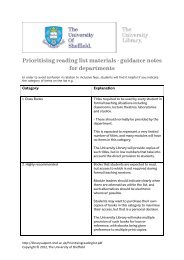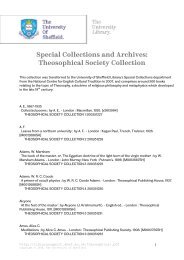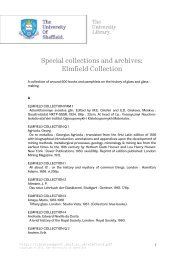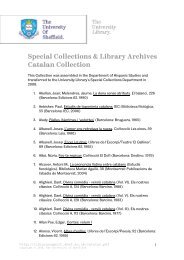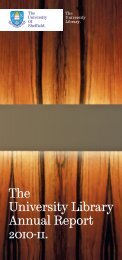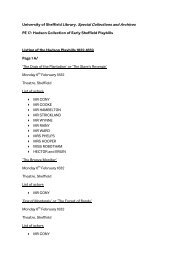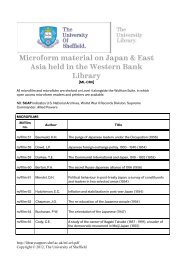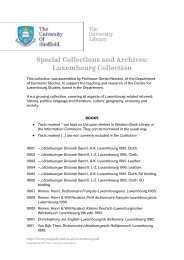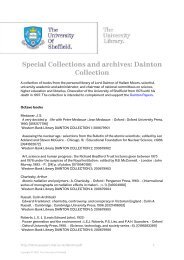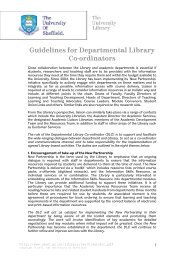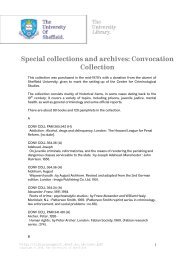The Geoffrey Bullough Collection - Temporary Home Page ...
The Geoffrey Bullough Collection - Temporary Home Page ...
The Geoffrey Bullough Collection - Temporary Home Page ...
Create successful ePaper yourself
Turn your PDF publications into a flip-book with our unique Google optimized e-Paper software.
as to clothes, a flower and a butterfly are finer than anybody in the land.‖ (p.<br />
6)<br />
7. Other points of interest<br />
In-text glossing, not just of dialect vocabulary, but also of respellings. For instance:<br />
―…the forks are nobert spewns we nicks in, yo may manage wi a fork if yo shuv<br />
the stuff on forst (first) wi (with) your fingers.‖ (p. 31)<br />
<strong>Bullough</strong> <strong>Collection</strong> No. 373 Christie Johnstone: a novel by Charles Reade<br />
1. Publication details<br />
Author: Reade. Charles<br />
Author dates: 1814-1884<br />
Title: Christie Johnstone: a novel<br />
Publication: London: Chatto & Windus, 1905<br />
First published: 1853<br />
Library reference: 200351001<br />
2. Genre / subgenre<br />
Literary fiction<br />
3. Brief synopsis<br />
Satirical novel which recounts the life, loves, misfortunes, and times of Viscount<br />
Ipsden, an indolent aristocrat.<br />
4. Overview of varieties / dialects<br />
Much of the novel is set in a cluster of villages in Scotland. While the main characters<br />
(including Ipsden‘s manservant, Saunders), are accorded stE dialogue, the speech of<br />
the Scottish characters is consistently rendered in heavily-marked dialect.<br />
5. Variety # 1: Ipsden‘s first meeting with Scots Jean Carnie and Christie Johnstone<br />
5a. Sample of dialect<br />
Lord Ipsden, rising gently from his seat, with the same quiet politeness with which he<br />
would have received two princes of the blood, said, "How do you do?" and smiled a<br />
welcome.<br />
"Fine! hoow's yoursel?" answered the dark lass, whose name was Jean Carnie, and<br />
whose voice was not so sweet as her face.<br />
"What'n lord are ye?" continued she; "are you a juke? I wad like fine to hae a crack wi'<br />
a juke."<br />
Saunders, who knew himself the cause of this question, replied, _sotto voce,_ "His<br />
lordship is a viscount."<br />
"I didna ken't," was Jean's remark. "But it has a bonny soond."<br />
"What mair would ye hae?" said the fair beauty, whose name was Christie Johnstone.<br />
<strong>The</strong>n, appealing to his lordship as the likeliest to know, she added, "Nobeelity is jist a<br />
soond itsel, I'm tauld."<br />
<strong>The</strong> viscount, finding himself expected to say something on a topic he had not<br />
attended much to, answered dryly:<br />
"We must ask the republicans, they are the people that give their minds to such<br />
subjects."<br />
"And yon man," asked Jean Carnie, "is he a lord, too?"<br />
"I am his lordship's servant," replied Saunders, gravely, not without a secret misgiving<br />
whether fate had been just.<br />
"Na!" replied she, not to be imposed upon, "ye are statelier and prooder than this<br />
ane."<br />
5b.1 Orthography<br />
Elision yoursel‟; what‟n; wi‟ [note apostrophe]<br />
Eye dialect juke<br />
http://librarysupport.shef.ac.uk /bullough.pdf<br />
Copyright © 2007, <strong>The</strong> University of Sheffield<br />
78





